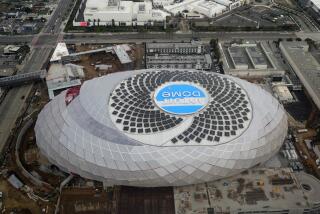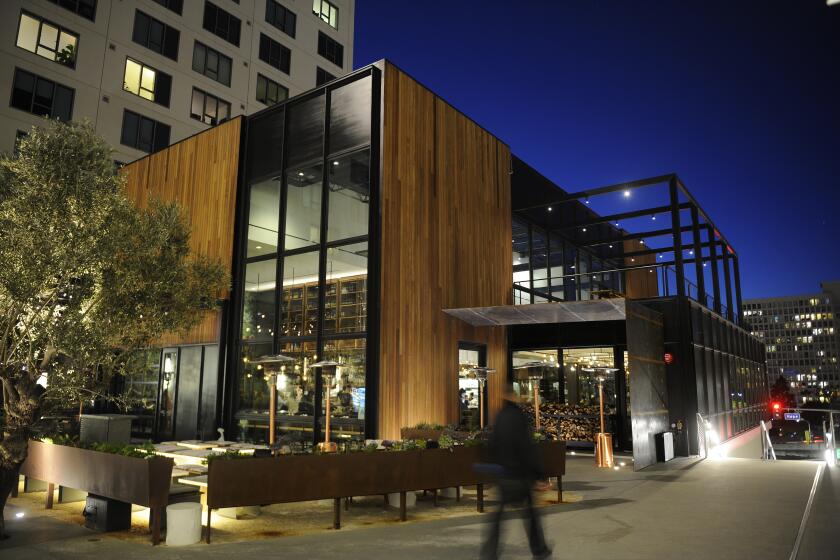Revelers Say Happy-Hour Ban Would Be Hard to Swallow
“High Tide Hour” at The Breakers Seafood Co. restaurant in Northridge runs from 4 to 7 p.m., Monday through Friday, complete with cheap drinks and “Hors D’Ouevres from Around the World.”
Friday night, as the tables near the restaurant’s bar began filling up, reflecting the end of another workweek, the conversations ranged from the price of clams to computer software design. Some waited for dinner, others simply for another glass of Scotch.
By 6 p.m., the bar was full, with close to 50 customers. The worldly hors d’ouevres had a Mexican theme, and the drinks were sold at half price.
“I’m not sure it would do much good to eliminate happy hours,” restaurant manager Marty Valade said. “It’s fine with me if they do it, but I don’t think it’s the answer.”
With only a few exceptions, Valade’s comments were the typical of the reaction to a proposal to prohibit “happy hours.” The proposal is part of a legislative package designed to crack down on drunk or drugged driving.
Introduced Wednesday by state Sens. John Seymour (R-Anaheim) and Newton R. Russell (R-Glendale), the proposal would prohibit discount prices, 2-for-1 promotions and any other special discounts for alcohol during limited periods of the day. Violators would be subject to fines and liquor license suspensions.
At a press conference in Sacramento, Seymour said the bill would discourage casual drinkers from downing a few too many after work, the usual time for happy-hour discounts.
At the bar in The Breakers Seafood Co. on Tampa Boulevard, which attracts a white-collar clientele, the “casual drinkers” Seymour described looked coldly on his proposal. Although all agreed that drunk driving is a serious problem, the consensus was that “High Tide Hour” was more of a tradition than a trap.
“It might be appropriate in a state where the drinking age is under 21,” Todd Tiny said, sitting at a table full of college students from nearby California State University, Northridge. “But there’s no good reason to get carried away.”
Tiny, who was nursing a beer, said he and his friends came to the happy hour because it was cheap, not because they wanted to get drunk.
That opinion was shared by an elderly man and woman from Woodland Hills who sat at a nearby table eating oysters and drinking wine coolers.
“I don’t think it’s a productive idea,” the woman said of the proposal to ban happy hours.
“We’re here because we can’t afford to come to a nice place at the prices they normally charge,” said the woman, who would not give her name because “all of my children are teachers.”
At a table full of employees from a nearby engineering firm, reactions were stronger, though a little more mixed.
“I’ve been going to happy hours for 25 years and I’ve never been drunk in my life,” said 54-year-old Bergde Yazaryan, who had an empty beer glass in front of him. “I am here to unwind and to see my friends after work. . . . Getting drunk is getting drunk. This is not the same.”
Lee Angeles, 55, agreed with his friend across the table. To him, a ban on happy hours seemed like just another governmental intrusion into his life.
“All it will do is raise prices,” he said before ordering a $1 Scotch. “People will drink at cheaper bars. . . . Pretty soon they will be telling us how to breathe.”
His argument drew a comment from Marlene Levine, a secretary from Chatsworth, who was also sitting at the table.
“Happy hours have good points and bad points,” she said. “The good points are that they cost less and that they’re good for socializing. But the bad points. . . . Well, I don’t know. I’ve got a son who just started driver’s training, and I went to see those educational films the other day.
“You know, it’s pretty horrible what drunk drivers can do.”
Tom DiSilvero, 26, sat just ahead of the engineers, with friends from a nearby software firm. Like most of the bar’s patrons, he said he favored a strengthening of laws against drunk driving on grounds that the state ought to “zap ‘em when they’re caught.”
But DiSilvero did not think much of the happy-hour clause. It would not discourage habitual drunk drivers from drinking, he said.”
“It’s a problem of responsibility,” he said. “A jerk is a jerk, and a drunk driver will drive drunk even if he has to pay. . . . If it’s your goal to get blasted, you can go down to the liquor store and get yourself a bottle of Ripple for 99 cents. . . . I don’t think the bars are the problem.”
DiSilvero’s opinions were not shared, however, by Dennis Vincent, a 40-year-old Chatsworth bank executive who was sitting at the end of the bar, drinking a beer. “I would say abolish them,” he said of happy hours. “Drinking is a luxury and it should be treated as a luxury. It serves no useful purpose.”
More to Read
Eat your way across L.A.
Get our weekly Tasting Notes newsletter for reviews, news and more.
You may occasionally receive promotional content from the Los Angeles Times.










